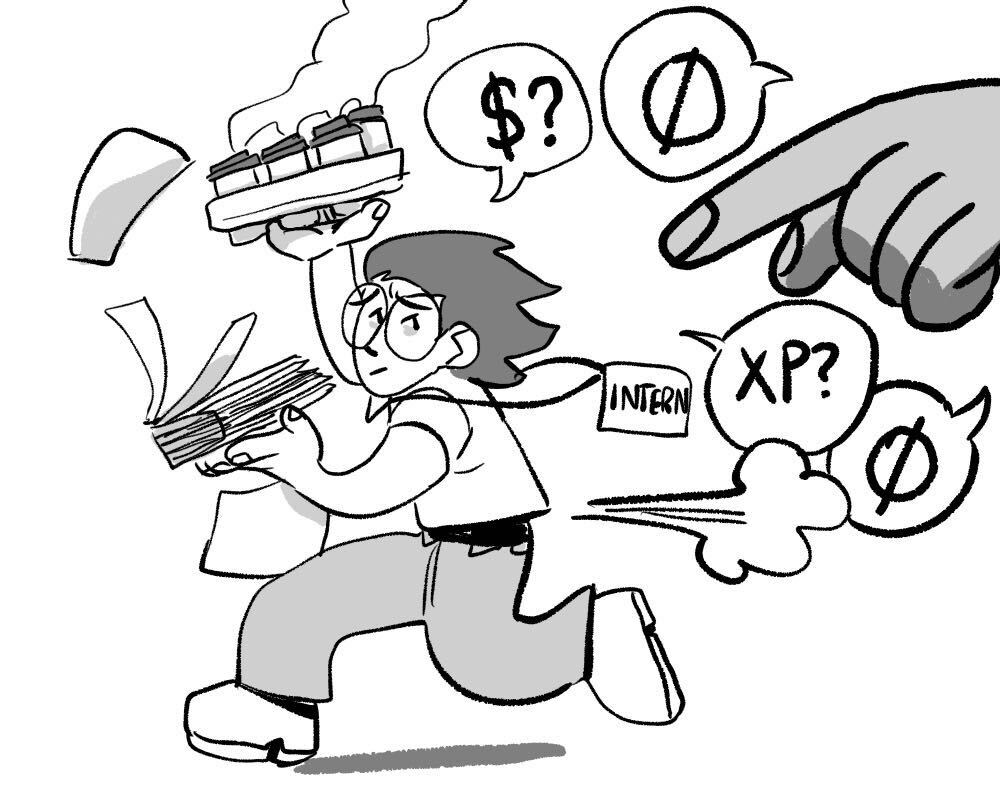Spring internship season is fast approaching, inviting the ever-looming yet ultimately ignored question of whether it’s unfair that companies pay their interns less than permanent employees. Food and housing costs aren’t getting any lower, but with the job market growing more competitive than ever, some believe experience may have more monetary value than actual money.
In an attempt to determine once and for all how to ethically and fairly compensate America’s interns, The Pitt News conducted the following exclusive interview with worker’s rights expert and aspiring monopolist, Dr. Moneybags McCash the Second.
Thomas Riley: It’s a pleasure to speak with you, Dr. Moneybags McCash the Second.
Moneybags McCash: Please, Dr. Moneybags McCash the Second is my father’s name. Call me Dr. Moneybags McCash the Minute.
TR: OK.
MM: Even though there is nothing minute about my wealth.
TR: OK. So, as the CEO of a Fortune 500 company, you employ over 1,000 interns across the country every year. Are these internships paid?
MM: Well, as with any company, some positions are paid and others aren’t. It depends on a lot of factors. For example, my son is a paid intern.
TR: Oh, that’s nice. Anyone else?
MM: No, of course not. But let me tell you why. In this day and age, experience is the most valuable form of compensation you can get. It’s even better than money. Picture a homeless man for a moment. Can you do that for me? Can you picture a homeless man?
TR: Sure.
MM: What do you think would help that person more? $5, or a PhD in electrical engineering?
TR: I would have to say the PhD.
MM: Precisely. Experience is what’s really valuable. But this got me thinking. Here I am, every summer, giving thousands of interns the functional equivalent of a PhD in electrical engineering — all for free! Is that not preposterous?
TR: That’s certainly one word for it.
MM: My company can’t handle paying people in all this experience. It’s simply not in our budget. I could downsize, hire fewer interns, even take a pay cut of my own, but that just won’t do. Because, tell me, is my name Moneyknapsack?
TR: No.
MM: Is it Moneyfanny-pack?
TR: No.
MM: Is it Moneylittle-purse-that-only-holds-a-pack-of-Marlboros?
TR: No.
MM: No! Of course it’s not! Because that is my mother’s name! I am MoneyBAGS. I need to make bags and bags of money. Downsizing is for those middle-class, petit bourgeois posers like Bezos and Musk.
TR: So how do you do it? You’re still projected to hire nearly 800 interns this spring alone.
MM: Well, Thomas, I’m just going to bring an IED to work.
TR: Oh dear.
MM: Yes, that’s right — an Internship Experience Deleter. It’s a magnificent device that can erase from anyone’s mind all the skills and on-the-job training they got over the course of their internship. And on top of that, part of our onboarding process requires they sign an agreement not to use the internship on their resumés. They’ll leave their job almost exactly how they arrived!
TR: Wow, that’s really something. So then what’s the incentive to work at your company? Is there any benefit at all?
MM: “What’s the incentive to work?” How about propping up the economy? How about supporting one of America’s most successful businesses? How about the opportunity to influence the invisible hand of the market while remaining invisible to the IRS? No payroll means no taxes.
TR: I don’t know if tax evasion is as fun for people who don’t have taxes to evade.
MM: Nonsense. These interns have it far too good, and they know it. The IED is the next step in knocking those entitled little busybodies down a peg. Everyone wants experience and exposure, but no one’s willing to spend a couple years performing backbreaking labor for no personal benefit whatsoever. We used to be a great country, then the greed of these workers ruined everything.
TR: You raise some very compelling points, Dr. McCash. I may even venture to say you’ve irrefutably solved the wage problems I came here to investigate.
MM: Well, it’s what I do. These workers are good people at their core — really, they are — they just need a strong leader to tell them which rights they actually need. Someone’s gotta mold the attitudes of the next generation of interns, and I really am more than happy to be the one to do it.



